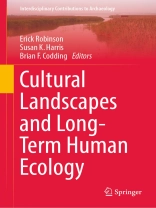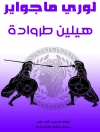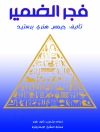Bringing together an international set of scholars, this volume presents integrative theoretical and methodological perspectives linking two complementary approaches in anthropological archaeology: cultural landscapes and human ecology. Authors grapple with issues ranging from the hunter-gatherer populations of North America and the emergence of the Neolithic in Europe to contemporary hunter-gatherer societies, using approaches from ethnoarchaeology to geomorphology, and methodological specialties from stable isotopes to social networks, in order to shed light on prehistoric human adaptations and how they produce cultural variation on a landscape scale. Together, contributions to this volume illustrate how interdisciplinary and integrative perspectives can aid archaeology by providing the means necessary to interpret and explain long-term records of human activity.
This book capitalizes on the unique position of archaeology, and the long-term records of human ecology and cultural resilience the discipline develops, to make significant contributions to contemporary discussions of long-term climate human-environment interactions throughout the Holocene. The book is therefore produced during a perfect time in which other disciplines are focusing on the unique contribution that can be made by archaeology.
Inhoudsopgave
Chapter 1. Cultural Landscapes and Long-Term Human Ecology (Erick Robinson, Susan K. Harris, and Brian F. Codding).-Chapter 2. Models, Foragers, Human Beings, and a Hunter-Gatherer Career (Douglas B. Bamforth).- Chapter 3. Defining and Modeling the Dimensions of Settlement Choice: An Empirical Approach (Kenneth L. Kvamme).- Chapter 4. Isobiographies and Archaeology Beyond Long-Term Ethnography: Life History Reconstruction Using Stable Isotopes (Jelmer W. Eerkens and Eric J. Bartelink).- Chapter 5. Caribou Inuit Activity and Settlement around Yathkyed: A Record of Archaeological Features in an Inland Arctic Landscape, Canada (Andrew M. Stewart).- Chapter 6. Resource Acquisition Risk and Gender Division of Foraging Labor: Australian Lessons for Hunter-Gatherer Archaeology (Brian F. Codding, Rebecca Bliege Bird, David W. Zeanah, and Douglas W. Bird).- Chapter 7. Niche Construction and the Ideal Free Distribution: Partners In Characterizing Past Human-Environment Dynamics (Sarah B. Mc Clure and Douglas J. Kennett).- Chapter 8. Reconsidering the Amazonian Interfluvial Occupation (Myrtle P. Shock).- Chapter 9. Early Holocene Human Ecology and Adaptation to Millennial and Centennial-Scale Climate Change: A Case Study from the North Sea Basin (Erick Robinson and Jacob Freeman).- Chapter 10. Technological Changes in Lithic Reduction as a Chronological Indicator in Surface Artifact Scatters (Susan K. Harris).- Chapter 11. Neolithic Cultural Landscapes in Southwestern Germany: Exploring Contributions of Regional Survey (Lynn E. Fisher, Susan K. Harris, Rainer Schreg, and Corina Knipper).- Chapter 12. Neolithic and Bronze Age Bog Settlements in the Federsee Basin (Baden-Württemberg, Germany) (Helmut Schlichtherle).- Index.
Over de auteur
Erick Robinson, Ph.D., RPA, is an Associate Research Professor of Climate and Archaeology in the Division of Atmospheric Sciences at the Desert Research Institute, Reno, Nevada, USA. He is also Vice President and Senior Archaeologist at Native Environment Solutions in Boise, Idaho, USA, and Visiting Scholar in the School of Human Evolution and Social Change at Arizona State University. He is Co-Leader of the Past Global Change (PAGES) International Working Group “Paleoclimate and the Peopling of the Earth (People 3000)”. He specializes in geochronology, geoarchaeology, lithic technology, paleodemography, and paleoecology. He applies these methods to research on Holocene hunter-gatherers and agricultural transitions in northern Europe and western North America. He has authored of over 50 publications, including co-editing the Springer Press book “Lithic Technological Organization and Paleoenvironmental Change: Global and Diachronic Perspectives”. He was part of thelong-term National Science Foundation-funded project “Populating a Radiocarbon Database for North America”, and is currently co-PI for the NSF-funded project “Hydroclimatic Variability and the Evolution of Socioecological Complexity in Dryland Farming Communities”.
Dr. Susan K. Harris earned her Ph.D. at the University of California, Santa Barbara under the supervision of Dr. Michael Jochim, completing 6 field seasons as part of the Southwest German Archaeological Survey Project. She received a Fulbright Fellowship to study at the University of Tübingen, Germany and a National Science Foundation (NSF) Dissertation Improvement Grant for research on the Mesolithic in southwest Germany. She was co-Principal Investigator on a NSF-funded field project focusing on Neolithic chert resource acquisition in southwest Germany, and received a NSF International Research Fellowship to analyze a chert quarry excavated as part of that project. Other projects include development of a database of Paleolithic sites in Schleswig-Holstein, Germany, at the Center for Baltic and Scandinavian Archaeology. She was a co-editor on the volume The Final Palaeolithic of Northern Eurasia, Proceedings of the Amersfoort, Schleswig and Burgos UISPP Commission Meetings. Her research on the Mesolithic and Neolithic of southwest Germany has been presented at numerous conferences including the Society of American Archaeology annual meetings, the Mesolithic in Europe, and the UISPP Commission on Flint Mining in Pre and Protohistoric Times. Dr. Harris currently works for the Office of the Registrar at the University of California, Santa Barbara.
Brian F. Codding is Professor of Anthropology and Director of the Archaeological Center at the University of Utah. His research explores the dynamic interactions between humans and ecosystems. He has authored or co-authored over 100 publications across ethnographic and archaeological contexts in the Americas and Australia, and hasbeen awarded multiple National Science Foundation grants to examine patterning in past and present socioenvironmental systems. Current projects focus on building robust methods for demographic reconstruction, assessing the impacts of climate change on Indigenous societies, understanding the emergence of social inequality among subsistence populations, identifying factors that promote peace within and between groups, and examining how long-term human-environment interactions shape ecosystem function in order to assist Tribal restoration efforts.












